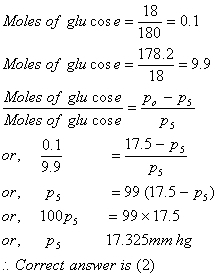All India Engineering / Architecture Entrance Examination (AIEEE)
CBSE Guess > AIEEE > AIEEE Papers > 2008 > Chemistry
AIEEE 2008 Chemistry
Q. 26. Larger number of oxidation states are exhibited by the actinoids than those by lanthanoids, the main reason being
- more energy difference between 5f and 6d than between 4f and 5d orbitals.
- more reactive nature of the actinoids than the lanthanoids.
- 4f orbitals more diffused than the 5f orbitals.
- lesser energy difference between 5f and 6d than between 4f and 5d orbitals.
Sol: The energy difference between 5 f and 6d is very less than that between 4f and 5d orbitals. Therefore, in actinoids, the electron can be removed from 5f and 6d both. So, they exhibit more number of oridation state.

Q. 27. In a compound, atoms of element Y form ccp lattice and those of element X occupy 2/3rd of tetrahedral voids. The formula of the compound will be
- X2Y
- X3Y4
- X4Y3
- X2Y3
Sol:

Q. 28. Gold numbers of protective colloids (A), (B), (C) and (D) are 0.50, 0.01, 0.10 and 0.005, respectively. The correct order of their protective powers is
- (A) < (C) < (B) < (D)
- (B) < (D) < (A) < (C)
- (D) < (A) < (C) < (B)
- (C) < (B) < (D) < (A)
Sol: If the gold number of a protective coil is less then its protective power is good.
0.005 < 0.01 < 0.10 < 0.50
or, (A) < (C) < (B) < (D)

Q. 29. The vapour pressure of water at 200C is 17.5 mm Hg. If 18 g of glucose (C6H12O6) is added to 178.2 g of water at 200C, the vapour pressure of the resulting solution will be
- 16.500 mm Hg
- 17.325 mm Hg
- 17.675 mm Hg
- 15.750 mm Hg
Sol:
